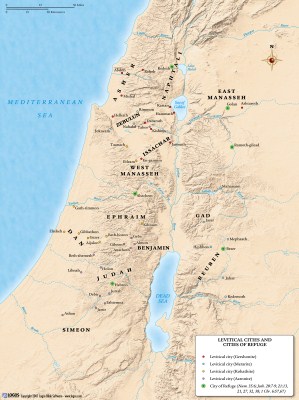19:1–21 This chapter is a collection of various laws concerning cities of refuge |
19:3 You shall prepare the roads Each of the cities of refuge was centrally located in the regions described in Deut 34:2.
19:4 has killed his neighbor unintentionally See Num 35:16–21; and see note on Deut 19:1–3. Verse 5 gives the scenarios in which one might unintentionally take another’s life and thus have recourse to a city of refuge.
19:6 the avenger of The Hebrew word used here, go'el, refers to the nearest relative to whom the obligation fell to right a wrong on behalf of the family. One of the responsibilities was avenging the death of a family member. In the context of the cities of refuge and blood vengeance, the go'el functions as legal executioner when laws about refuge are violated (see note on v. 12). See Num 35:12.
19:9 by loving Yahweh your God See 6:4–5. This, the greatest commandment, is principally tied to life and possession of the promised land. See 4:26–28, 40; 5:30–33; 6:16–19; 7:12; 8:1 (compare Lev 26).
you shall add three more cities See Deut 19:2, 7; compare Num 35:14; Josh 20:7.
19:10 bloodguilt would be on you The point here is preventing the one who had unintentionally taken a life from being killed. See Num 35; compare note on Deut 19:1–13.
19:11 murders him Or, commits intentional homicide. See Num 35:16–21.
19:12 the elders of his city This term generally refers to heads of the families, tribes, or towns. It seems that elders are also called judges in Deuteronomy, though the two terms may distinguish two groups (see Deut 16:18; 17:9, 12; 19:17–18; 25:2). These leaders act as a judicial body that judges problems of civil and family law.
19:14 the boundary marker of your neighbor Landmarks, usually an identifiable stone, indicated property boundaries. Moving them was a serious offense, as it amounted to stealing ancestral land from a neighbor (27:17). Israelites considered these boundaries sacred, as illustrated by the episode involving Naboth (1 Kgs 21:3).
that former generations set up One’s ancestors would have set the marker in place. See Prov 22:28.
19:15–21 The laws in this section are intended to ensure a correct, proper verdict in legal proceedings and to protect the innocent from wrongful accusation and conviction. The penalty for bearing false witness was severe (Deut 19:19–21; compare 17:7). |
19:15 for any wrongdoing This clarifies that the requirement was not just for cases involving capital crimes. Compare 17:6.
the evidence of two witnesses or on the evidence of three witnesses At least two witnesses were required to establish guilt. Compare 17:6.
19:16 a malicious witness This verse provides context for the Decalogue command not to bear false witness (Exod 20:16).
command not to bear false witness (Exod 20:16).
19:19 you shall do to him as he meant This principle—known as lex talionis (and summarized by the idea of an “eye for an eye”)—requires punishment equivalent to the crime (see Exod 21:24; Lev 24:17–22).
19:20 they shall not continue to do such a thing again as this evil thing The punishment creates a deterrent against similar acts of evil.
19:21 life for life If the witness was not truthful in a capital case, he or she would be sentencing an innocent person to death, thereby committing murder (Deut 17:7).

|
About Faithlife Study BibleFaithlife Study Bible (FSB) is your guide to the ancient world of the Old and New Testaments, with study notes and articles that draw from a wide range of academic research. FSB helps you learn how to think about interpretation methods and issues so that you can gain a deeper understanding of the text. |
| Copyright |
Copyright 2012 Logos Bible Software. |
| Support Info | fsb |
 Loading…
Loading…

